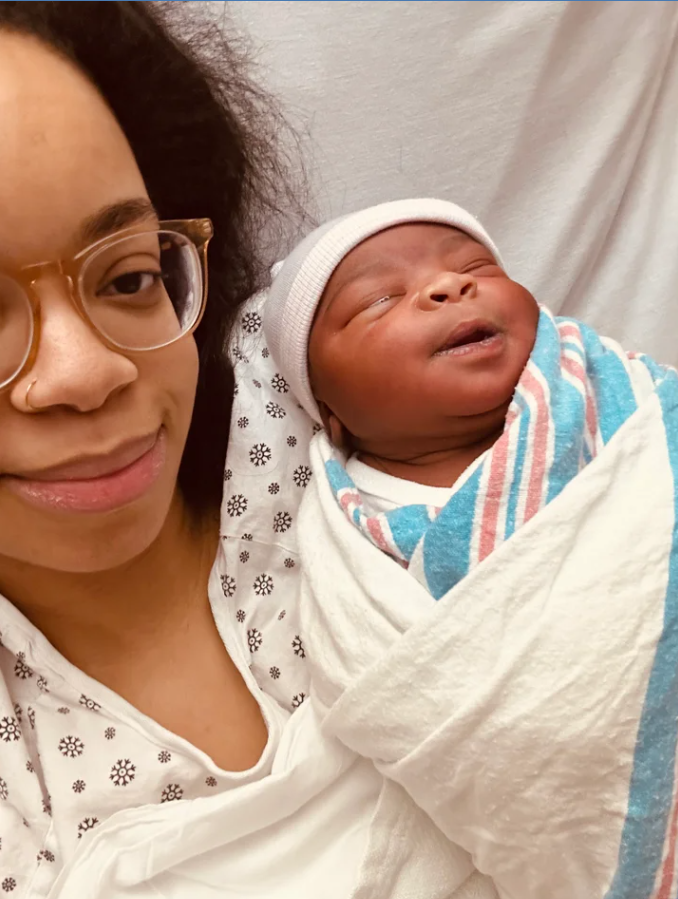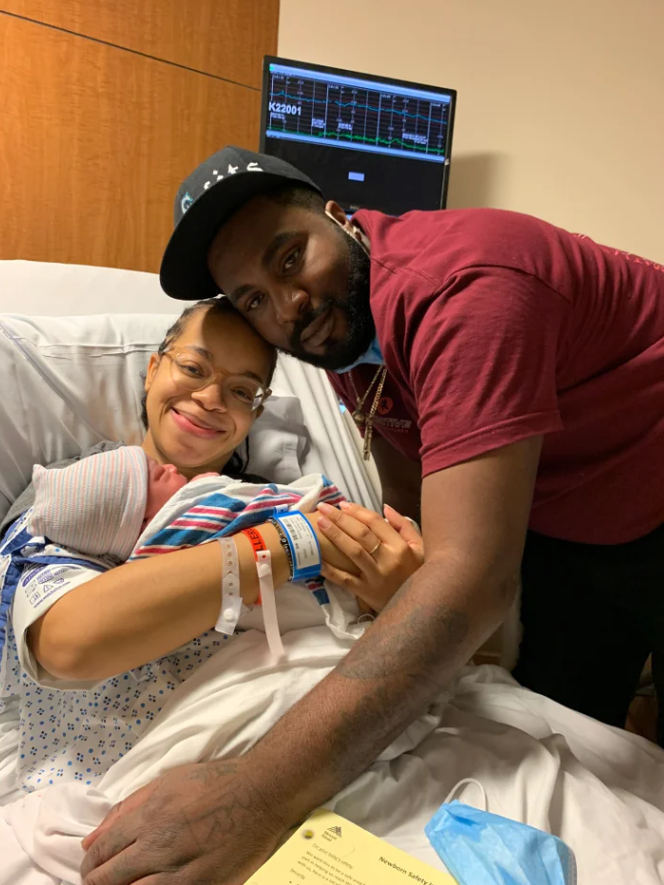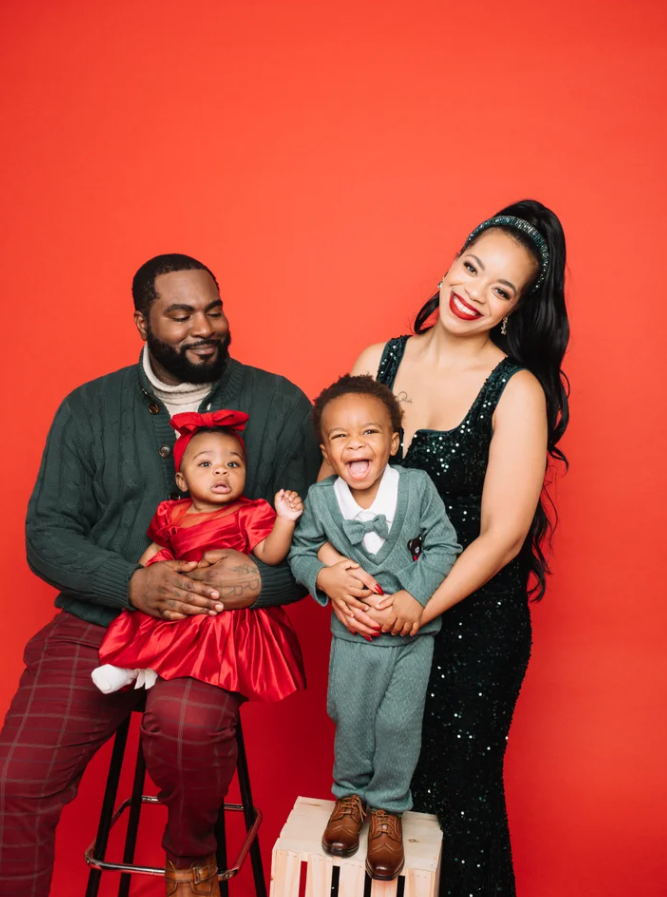
Zakkiyya Reece thought she understood childbirth. She had prepared relentlessly, studying every guide, devouring every birth story, bracing for every scenario. She imagined the slow build — contractions, the cinematic rush to the hospital, a crowd of professionals ushering her safely into motherhood. She thought if she just prepared hard enough, she could control it.
But birth doesn’t care about plans. It humbles. It cracks you open.
It was a Friday morning, thick with NYC rush hour traffic. Zakkiyya and her partner, Maurice, were inching down the FDR Drive, trying to make it from the Bronx to a Manhattan hospital. She made this choice early, fueled by a persistent, gnawing fear: “Will they take me seriously if I stay local?” She had heard too many stories that said otherwise.
She remembered Amber Isaac. She remembered her warnings, her pleas for help. She remembered her death. Amber’s face stayed with her, a constant whisper: “Stay alive.”
She labored at home longer, trusting the plan she had made with her doula. “Going too early starts the clock on interventions,” the doula had said. But something felt wrong. There was a “pop” inside her, and then her contractions crashed over her, one minute apart. No slow burn. No easing in.
By the time Maurice retrieved the car, she was alone on the bathroom floor, gripping the cold tile, praying.
Forty blocks from safety, she gasped, “Pull over. I can feel his head.”
Maurice’s hands shook as he caught their son, Avery Santana, his arrival as sudden and unstoppable as a summer storm.
She cradled Avery to her chest. She felt his heartbeat against hers and whispered, “We did it. We made it.”
The ambulance arrived. They marveled at her. At the miracle in the front seat. But at the hospital, support turned into suspicion.
“Why didn’t you leave sooner?” they asked. “Did you want to deliver outside?”
The questions stung. No one explained she had just experienced precipitous labor, a birth that happens in under three hours. No one told her this wasn’t negligence; it was nature. They marveled at her strength but didn’t see her fear, her exhaustion.
RELATED: What Black Expecting Mothers MUST Know About Their Rights (According to a Doula)

Tip #1: Know Precipitous Labor Signs
- Extremely fast contractions.
- Intense pressure.
- Very short transition from mild contractions to full labor. If it happens, trust your instincts. Get to help however possible.
Months later, Zakkiyya was pregnant again. Grateful — but terrified.
She found an online birth trauma circle. She met Erica, a doula with decades of wisdom, who told her what no one else did: “You didn’t fail. Your body isn’t broken. You birthed with extraordinary strength.”
Those words lifted a weight she hadn’t known she was carrying.
She prepared differently this time. A hospital further north. A detailed plan. Bags packed by the second trimester.
Still, birth laughed at her plans.
On a damp Sunday morning, back labor struck. A lightning bolt to the spine. She collapsed on the sidewalk outside her Bronx apartment. Her water broke, soaking her jeans, the concrete below.
Neighbors gathered. A woman shouted, “Let her lie down!” A stranger brought a chair. A bus pulled up, and somehow, an off-duty EMT was among its passengers. She knelt beside her, a steady presence.
“You’re doing amazing,” the EMT said. “Stay with me.”
She tried to focus. Tried to breathe. Voices swirled around her, but she anchored to Maurice’s hand, to the life about to break free.
Minutes later, in front of the laundromat, Kessler Jane was born into a city that paused for her.
She held her daughter to her chest. Her cry was strong, defiant. Her own was a silent sob, part relief, part grief.
At the hospital, the chaos resumed. Paperwork. Questions. Students gathered to watch.
A midwife leaned in, just as she struggled to deliver the placenta.
“So… what are you thinking for birth control?” the midwife asked.
She blinked, stunned. She found her voice and said, “I’m not thinking about that. I’m thinking about breathing.”
She realized survival isn’t the same as being cared for. Again.
RELATED: I Was Gaslit by Doctors During Pregnancy—Now I Fight to Save Other Mothers

Tip #2: Advocate for Yourself Post-Birth
- Ask for a pause in questions until stabilized.
- Request fewer students in the room if feeling overwhelmed.
- Demand trauma-informed care. Experience matters.
Each birth stripped her bare and rebuilt her.
She learned that strength isn’t just about endurance. It’s radical surrender. It’s trusting her body when everything around her feels out of control. It’s knowing she is still worthy of dignity and care.
She knew she was part of a long lineage — a line of Black mothers who birthed through fear, who survived neglect, who brought life into a world that didn’t always honor theirs.
“You did it,” she whispered again, cradling Kessler.
“You did it,” Maurice said, tears streaming down his face.
RELATED: My Horror Story: I Held My Newborns, Then Everything Went Black

Tip #3: Prepare for the Unexpected
- Have an emergency kit: towels, sterile scissors, gloves, etc.
- Map out several hospitals nearby.
- Educate the birth team about precipitous labor.
- Have affirmations ready. They’ll be needed.
Motherhood did not follow the story Zakkiyya wrote. It has shattered expectations. It has terrified her. It has stretched her past every limit she thought she had.
But it has also revealed something truer: her power.
Sometimes, the most extraordinary stories are born in chaos, in surrender, in raw, unstoppable love.








